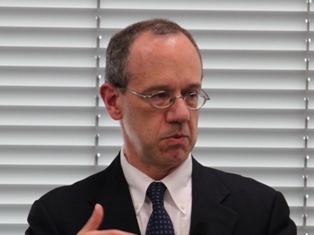Event Report Foreign Affairs and National Security
"Discussion with Professor Aaron L. Friedberg"
,
13:00
- 14:30
Venue: CIGS Meeting Room 3

Discussion
Dr Friedberg made the following observations on the question of:"What will be the character of relations between the United States and China over the next 4 years?"
The United States has been pursuing a consistent strategy since the early part of the 1990s: a dual approach of engaging China while maintaining a balance of power in the Asia-Pacific region. The objectives of the strategy are, firstly, the integration of China into the existing international system and secondly, a consistent encouragement of China to move away from authoritarian rule and toward a more democratic society.
In its first term, the Obama administration sought to continue the strategy inherited from the previous administration with emphasis on the 'engagement' aspect of the policy. In hindsight we can see that this was not effective. During this period China began to adopt a more assertive foreign policy toward its Asian neighbors. Notable examples of this were opposing the US and South Korea over the Cheonan Incident; the Senkaku Boat Collision Incident-both of which occurred in 2010-as well as ongoing territorial disputes with India and with several countries in the South China Sea. It is possible that China has misread US resolve in the region.
From 2010, the Obama administration shifted its policy away from 'engagement' towards an advancement of a balance of power in the Asian region. The peak of this strategy came in November 2011 with the deployment of the US Marines in Darwin, Australia. This so-called "pivot" of US policy originally emerged to reassure allies in the region of continued US support, maintaining a power balance and discouraging further Chinese bellicosity. The question is whether the US will follow through on this tougher policy toward China.
The relationship between the US and China has remained fundamentally unchanged, and the pivot remains the most effective policy for the US. Nonetheless, doubt exists over whether the US will continue to follow this strategy. There are three reasons for this. Firstly, in President Obama's second term many of the main advocates of the pivot strategy have left the administration and have been replaced by people less amenable to this policy. Second, there was a growing concern in the US that the policy appeared provocative and some were keen to return to a more 'engagement-centred' approach. Lastly, and perhaps the most important factor, is fiscal constraint. Defense spending is due to be cut by $400 billion over the next ten years, and further cuts may have to be made due to budget sequestration.
These uncertainties over future US policy as well as that of China bring us back to the reasons behind the shift toward greater assertiveness seen from China in 2010 which continues into the present. There are a variety of different theories on this.
One such theory is that China's assertiveness in 2010 might have been an aberration: there were a series of unforeseen incidents to which China had no choice but to respond to in a relatively assertive manner. That these incidents coincided with the run-up to the 2012 leadership transition in which candidates traditionally adopt a more hard-line stance supports such a theory. Some say that China is a rational actor and must recognize that the policies it pursued in 2010 were counterproductive and invited the US pivot. Therefore, in time, China might be expected to adopt a less aggressive policy.
An alternative view is that the Chinese leaders' assessment of their power relative to that of the US has changed and they have concluded that in the wake of the 2008 financial crisis that American power is declining rapidly. If China's assertiveness is a product of such a reassessment of its own power, whether this will change their attitude depends on what action is taken by the US and its allies. A robust policy should be maintained to disprove this impression among Chinese leaders.
Another possible explanation is that Chinese nationalism may have become a constraint on policymakers making it difficult for them to adopt more accommodating policies and that somehow China inclines towards more assertive or aggressive policies due to internal factors. This is potentially a more dangerous scenario.
Some speculate that there has been a gradual change in the character of the top leadership to something more closely resembling a 'collective' leadership. If this is the case, it could potentially cause a paradoxical situation where the safer policy for a weaker 'collective' leadership may be a more assertive or aggressive one, in the belief that policies similar to those adopted in the run-up to the transition may be more effective.
There is some concern about recent statements made by 'rouge' PLA officers of a particularly hostile and aggressive nature. The PLA is influential in policymaking and frequently advocates a tougher foreign policy which serves their institutional interests. These individuals may not be just rouge officers but may represent a significant body of opinion within the military and elite security services, for example Communist Party ideologists.
A growing factor in the Chinese system is the increasing role of interest groups in policy direction. Some of these groups would certainly see their interests being served by a more assertive or aggressive stance even if this is detrimental to the interests of the nation as a whole. Similar scenarios have been seen in the past, particularly in Germany before World War I and in Japan in the lead up to World War II. Leaders in this situation often pay more attention to internal than external influences.
In answer to the question posed at the beginning of his speech, Dr Friedberg concluded his remarks by saying that although he did not have a definitive answer,
"...my best guess would be that what we are going to see is a temporary and superficial improvement in the relation between the US and China that will be followed eventually by a return to a more competitive and more friction- and tension-laden atmosphere that is something more like in 2010-2011 than maybe 2012-2013."
During the discussion session, Dr Friedberg added the following observations:
◇On the Senkaku issue, China's strategy may be to create divisions between the US and Japan. Some speculate that China is taking a provocative course in order to force US intervention knowing that in this way the US-Japan relationship could possibly become strained.
◇The stated policy of the Obama administration-that the US does not take a position on the resolution of sovereignty disputes except for a desire for a peaceful resolution-is correct. However, it may need to be stressed to China that any excessive actions will be met by a joint US and Japanese response.
◇Japan should take note that there are many people in the US Congress and within the administration of the opinion that Japan is responsible for the recent increase in tensions over the Senkaku Islands and that both countries' nationalists are guilty of exacerbating the tension through China's tacit approval of anti-Japanese riots and provocative statements by Japan's fringe political figures.
◇Discovery of the shale deposits may alter the US economic position significantly in terms of GDP growth and the deficit problem. By contrast, China's problems are fundamental and deep in terms of demography, environment, resources, corruption and inequality. The next twenty years may see changes in the relative economic and military positions of the US and China. If China believes that their relative strength will decline they may conclude it is better to act promptly and decisively. So the next ten years may be the most dangerous moment when the military balance is tilting China's way.
◇Some time after 2020 the growth rate of the Chinese economy may decrease. A question is whether a China encountering economic difficulties will be easier or more difficult to deal with. On the one hand, China might be preoccupied with internal problems. Alternatively, there are historical instances in which regimes facing internal unrest and difficulties have behaved aggressively, in part to distract attention from those problems and to unify the country.
◇The political liberalization of China is, in the long run, the most hopeful course. It does not solve all problems, but a more liberal, more open, and genuinely democratic China can gain trust internally and externally. A potential problem is that societies in transition from stable authoritarian to stable democracy are actually the most prone to act aggressively. This will be a concern over the next twenty years.
◇There is also the ideological or 'values' gap between the US and China. The foreign policy of liberal democracies tends to be ideological. Accordingly, the US does not appease an authoritarian China nor does it abandon its democratic friends and allies. It believes that shared values should be the basis for closer cooperation. Consequently the US is making efforts to build an international community with other democratic countries. It is not clear which direction China is headed, but it will be important to engage with China successfully over the next ten years.
